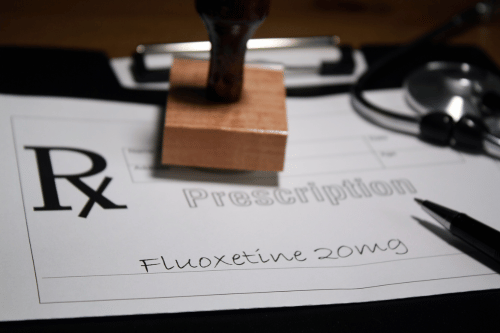Is Prozac Addictive? Understanding the Risks and Realities
Prozac, also known as fluoxetine, is one of the most commonly prescribed medications for treating mental health disorders such as depression, obsessive-compulsive disorder (OCD), panic disorder, and premenstrual dysphoric disorder (PMDD).
As a prescription medication, Prozac is significant in treatment protocols and must be taken as prescribed by a healthcare provider to prevent potential withdrawal issues. As a member of the selective serotonin reuptake inhibitors (SSRI) class of drugs, Prozac works by affecting the brain’s serotonin levels to stabilize mood and emotional health. However, despite its widespread use, many people wonder, Is Prozac addictive?
While Prozac is generally not considered an addictive drug in the way substances like opioids or alcohol are, it can still lead to withdrawal symptoms and psychological dependence if stopped abruptly. In this comprehensive guide, we will explore what Prozac is, how it works, and whether it can cause addiction. Additionally, we will discuss Prozac withdrawal symptoms, potential dependency, and steps to take if you’re considering discontinuing the medication.
What is Prozac?
Prozac (fluoxetine) was introduced in the 1980s as a groundbreaking treatment for depression and quickly became a standard treatment for other mental health conditions like obsessive-compulsive disorder, panic disorder, and premenstrual dysphoric disorder. Prozac is often prescribed because of its relatively low risk of serious side effects compared to older antidepressants, as well as its ability to improve mood and alleviate symptoms of mental health disorders.
As an antidepressant medication, Prozac works by targeting serotonin, a chemical messenger in the brain that plays a critical role in regulating mood, anxiety, and overall mental stability. Prozac inhibits the reuptake of serotonin, allowing higher levels of the neurotransmitter to remain in the brain, which can help stabilize emotions and reduce the symptoms of depression and other conditions.

Is Prozac Addictive?
The question of whether Prozac is addictive depends on how you define addiction. In a traditional sense, addiction refers to a compulsive need to use a substance despite harmful consequences. Addictive substances like alcohol, opioids, and certain prescription drugs cause physical and psychological cravings, leading to substance abuse.
Prozac, on the other hand, is not considered an addictive drug according to this definition. It is not a controlled substance, meaning it doesn’t create the same kind of cravings or compulsive behavior that substances like cocaine or heroin might induce. However, Prozac abuse can occur, leading to dependence on the medication and the need for targeted treatments to address both the misuse of Prozac and any accompanying substance abuse issues. Supervised tapering of the medication is important to avoid withdrawal symptoms, while also monitoring and managing the original symptoms for which Prozac was prescribed.
Prozac addiction, while not common, can develop through misuse, leading to potential dependency and the psychological and physical risks associated with its use. Withdrawal symptoms can occur upon discontinuation, making it essential to consult healthcare professionals regarding the responsible use of Prozac. Preventative measures and treatment options should be considered to manage any potential dependency.
Can You Develop a Dependence on Prozac?
While Prozac is not traditionally addictive, people can still develop a psychological dependence on the medication. This type of dependence is different from physical addiction because it doesn’t involve cravings for the drug or compulsive use, but it can still result in a strong reliance on Prozac for emotional or mental stability.
Individuals who have been prescribed Prozac for long-term use to treat conditions like major depressive disorder, obsessive-compulsive disorder, or panic disorder may find that they rely on the medication to manage their mental health. When they stop taking Prozac, especially without medical supervision, they may experience withdrawal symptoms such as:
Flu-like symptoms
Mood swings
Trouble sleeping
Weight gain or weight loss
Sexual dysfunction
Irritability or anxiety
These withdrawal symptoms, while not life-threatening, can be uncomfortable enough that the person may feel a strong urge to restart the medication. This can create a cycle of dependency, even though Prozac itself is not habit-forming in the traditional sense. Prozac addiction treatment as part of rehabilitation services is crucial, emphasizing the importance of supervised medical detox programs to ensure clinical support and emotional care during withdrawal.
What Are Prozac Withdrawal Symptoms?
Even though Prozac is not considered an addictive substance, many people report experiencing withdrawal symptoms when discontinuing the medication. Prozac, a selective serotonin reuptake inhibitor (SSRI), works by increasing serotonin levels in the brain to treat conditions like depression and anxiety. This is sometimes referred to as Prozac withdrawal, though the medical community often calls it “SSRI discontinuation syndrome.”
Prozac withdrawal symptoms can range from mild to severe and can last for weeks or even months, depending on factors such as how long the individual has been taking the drug and how abruptly they stop. Some common withdrawal symptoms include:
Flu-like symptoms such as headaches, nausea, and dizziness
Increased anxiety or irritability
Mood swings
Trouble sleeping
Cognitive disturbances such as “brain fog” or difficulty concentrating
Sexual dysfunction
These symptoms may mimic the return of the mental health condition Prozac was initially prescribed to treat, leading some individuals to feel that they cannot function without the medication. This cycle of dependency can feel similar to addiction, even though the underlying mechanisms are different.

Who is Most Likely to Experience Withdrawal?
Those who have been taking Prozac for an extended period are more likely to experience withdrawal symptoms when they stop taking the medication. Prozac is often prescribed for long-term use in conditions such as major depressive disorder, panic disorder, and obsessive-compulsive disorder, meaning that individuals with these conditions are at a higher risk for withdrawal.
Additionally, those who stop taking Prozac suddenly, rather than tapering off the medication slowly under the guidance of a doctor, are more likely to experience withdrawal. The long half-life of Prozac (meaning it stays in the body longer than other SSRIs) can reduce the severity of withdrawal symptoms, but it’s still important to discontinue use gradually to avoid uncomfortable side effects.
Managing Prozac Withdrawal: What You Should Know
If you’re considering stopping Prozac, it’s essential to do so gradually under the supervision of a medical professional. Abruptly stopping Prozac can lead to significant withdrawal symptoms, including flu-like symptoms, mood disturbances, and insomnia. Gradually tapering off the medication can help reduce the severity of these symptoms and allow your body to adjust to lower levels of serotonin more slowly.
A healthcare professional can work with you to develop a tapering schedule that gradually reduces your dose over weeks or months, depending on your unique needs. This approach is especially important for individuals who have been taking Prozac for several years or for those who are taking other prescription drugs to manage their mental health.
Prozac Dependency vs. Addiction: Key Differences
While Prozac is not traditionally considered addictive, some individuals may experience a type of psychological dependence on the medication. This dependence occurs when a person feels that they need Prozac to function or manage their mental health, even though the drug does not cause physical cravings or compulsive behavior like other addictive drugs.
For some individuals, discontinuing Prozac may trigger a return of symptoms like depression, anxiety disorders, or panic attacks, leading them to believe they are addicted to the medication. However, this reaction is not addiction in the traditional sense but rather a consequence of how the brain has adapted to higher levels of serotonin.
How Long Can You Take Prozac?
Prozac is often prescribed for long-term use, especially in individuals with chronic conditions like major depressive disorder, obsessive-compulsive disorder, and panic disorder. In some cases, Prozac may be prescribed for several years or longer to help manage symptoms and prevent relapses.
Its long half-life makes Prozac less likely to cause severe withdrawal symptoms compared to other SSRIs, but it also means that individuals may need to take it for extended periods to maintain its effectiveness. Patients should always consult their doctor before making any changes to their medication regimen, as stopping Prozac too soon can lead to withdrawal symptoms or a return of the original mental health condition.

What to Do If You Experience Withdrawal Symptoms
If you experience significant Prozac withdrawal symptoms, such as severe anxiety, mood swings, or trouble sleeping, it’s important to reach out to a healthcare provider. Withdrawal symptoms can be managed with medical guidance, and in some cases, restarting the medication at a lower dose may be necessary to prevent further discomfort.
For individuals struggling with Prozac withdrawal, additional treatment options may be available, including alternative medications, behavioral therapies, and holistic therapies. These treatment approaches can help individuals manage their symptoms while reducing their reliance on Prozac or other SSRIs.
Prozac and Your Mental Health: Finding Balance
While Prozac has proven to be an effective treatment for many mental health conditions, it’s essential to approach its use with awareness and caution. For most people, Prozac offers relief from depression, anxiety disorders, and other conditions, allowing them to live fuller, more balanced lives. However, for those who experience Prozac withdrawal or psychological dependence, it’s important to seek medical advice and explore alternative treatment options if necessary.
If you are considering stopping Prozac, don’t hesitate to consult your doctor for guidance on how to do so safely. With the right support, it’s possible to manage Prozac withdrawal and maintain your mental health without feeling dependent on the medication.
Final Thoughts: Is Prozac Addictive?
Prozac is not classified as an addictive substance, but it can lead to withdrawal symptoms and psychological dependence in some individuals. While most people will not experience severe side effects when discontinuing the drug, it’s crucial to approach Prozac use and discontinuation with care.
If you are considering stopping Prozac or if you have concerns about dependence, be sure to consult with a healthcare provider. With proper guidance, it is possible to discontinue Prozac safely and maintain your mental health without the need for medication.










